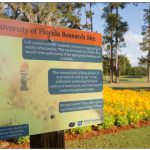Q: What’s wrong with my basil?
Here at Extension, we receive a lot of questions about struggling basil. One of the most common issues? A devastating disease called “basil downy mildew” which has become very widespread over the past few years… Most types of basil are susceptible to the disease, and unfortunately there are no effective treatments once a plant is infected.
(…BUT… a handful of varieties have shown varying levels of natural resistance. More on that in a second…)
Recognizing Basil Downy Mildew
Key characteristics to recognize downy mildew include:
- Pale yellowish patches on the leaves which start out neatly contained between leaf veins.
- On the underside of an affected leaf, you’ll often see gray spores, especially when the weather is very humid.
Image credit – Zelalem Mersha, UF/IFAS – Source: https://edis.ifas.ufl.edu/publication/pp271
Hope on the horizon…
Knowing that a small handful of basil varieties have natural resistance to downy mildew, incredible teams of researchers at several universities – including UF (of course!) – have been working non-stop to develop new, improved varieties of culinary basil that will be both delicious and vigorous.
Basil Breeding at UF – Watch the webinar!
(#SaveThePesto)
If you’ve ever wondered about how scientists develop new varieties of “old favorites” like basil, you’ll definitely want to check out this recent webinar featuring Dr. David Clark of the UF/IFAS Environmental Horticulture team.
(Spoiler alert – it involves an astounding numbers of seeds, plants, and people, plus some bizarre plot twists… including basil that tastes like window cleaner??? Eeew!)
Dr. Clark’s presentation provides a glimpse into the impressive effort it takes to bring a single new variety of plant to market. You’ll also hear about those researchers / heroes who tirelessly taste-tested and sniffed thousands of plants so you’ll hopefully never have to experience the tragic disappointment of a world without pesto… or a caprese salad that tastes like window-cleaner…
#NotAllHeroesWearCapes
#ThankAScientist
The webinar covers the new varieties (like ‘Amazel’ Basil) that you might already be seeing at a nursery near you, plus a few more varieties that will be coming soon.
Got downy mildew? What should you do?
Understand that there is no good treatment for downy mildew, and unfortunately, most traditional types of basil are susceptible. If your basil is displaying the telltale symptoms of downy mildew, unfortunately it will likely continue to get worse. And the longer it remains in your garden, the more spores it will shed. Therefore, it is advisable to harvest any unblemished branches that you’d like to save, dispose of the rest, and start over with one of the more resistant varieties.
If you can’t locate any resistant varieties via a local nursery, your best strategy will be to try growing your basil indoors in a sunny windowsill where the humidity is lower, at least until we get past the wettest part of summer.
For more information, photos, and suggestions of resistant varieties, check out the following links:
https://edis.ifas.ufl.edu/publication/pp271
https://www.vegetables.cornell.edu/pest-management/disease-factsheets/basil-downy-mildew/
https://gardeningsolutions.ifas.ufl.edu/plants/edibles/vegetables/basil.html
P.S. – You might be wondering what basil has to do with Florida-Friendly Landscaping… Well… when gardeners see their favorite plants struggling, their first instinct is often to apply more ______ (i.e. more water, more fertilizer, spray a pesticide, etc.) The idea of Florida-Friendly Landscaping is that we can help reduce the harmful & excessive overuse of water, fertilizers, and pesticides by “working smarter, not harder” – focusing on growing the “right plant” in the “right place” and giving the right care at the right time.
(And when the “right plant” doesn’t yet exist, there might just be someone at UF/IFAS working to grow it!)
Interested in learning more about Dr. Clark’s research developing vibrant new drought tolerant varieties of coleus? Check it out at – https://hort.ifas.ufl.edu/uf-coleus-breeding-program/
Curious about some of the other projects coming out of the UF Plant Breeding Program? Learn about improving the flavor and disease resistance of tomatoes, removing the invasive tendencies from lantana and Mexican petunias, reducing the chill requirements for blueberries, or pushing the boundaries on drought-tolerance in turfgrass… And that just barely scratches the surface!
By Frank Galdo
About the Author
As one of the Florida-Friendly Landscaping (FFL) Program Coordinators in Pasco County, I enjoy helping people learn how to create & maintain vibrant landscapes that DON’T require a lot of water, fertilizer, and pesticides to look their best. Through an innovative collaboration with Pasco County Utilities, I also provide targeted on-site troubleshooting outreach to help those individuals and communities identified as high water users. My motto is – “Less guesswork, better landscapes.” I can be reached at fgaldo@ufl.edu
Thirsty for more FFL knowledge? Don’t forget to follow us on Facebook & Twitter!
Have a question, comment, or idea for a future post? Let me know at fgaldo@ufl.edu or leave a comment below.
About UF/IFAS Extension: UF/IFAS Extension serves as a source of non-biased, research-based information for the residents, businesses, and communities of Florida, providing educational materials and programs for adults and youth. We proudly bring UF to you.
(Not in Pasco County? Not a problem! Click here to find your local UF/IFAS Extension office!)
UF/IFAS Extension Is An Equal Opportunity Institution.
 0
0





